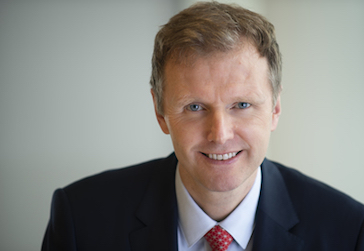Standard Life Aberdeen’s new CEO Stephen Bird is planning a big strategic shift for the active asset management giant by building a stable of passive index funds that could eventually account for as much as 30% of the firm’s assets.
The Edinburgh firm’s Aberdeen Standard Investments (ASI) business on Thursday launched a range of sustainable index funds.
In a Bloomberg interview published on Thursday, Bird said that if Standard Life Aberdeen is to grow, it will need to combine its active fund management strengths in stock-picking with a new embrace of the global move towards index funds.
Standard Life Aberdeen said on August 7 its first-half adjusted profit before tax fell 30% to £195 million while assets under management and administration slipped 6% to £544.6 billion after much-publicized Scottish Widows withdrawals by Lloyds Banking Group.
Bird is looking for acquisitions and new technology that will help the firm with its big move into passive investing.
Bird said passive funds are “an essential component of a full solution provider.”
“We are screening for which technology, which people, which capabilities can help us get there,” said Bird.
“An ideal active-passive split would be 70/30.”
Bird said he wants to turn Standard Life Aberdeen into a “21st century” competitor.
“If you stay as an old traditional asset class asset manager, you will be extinct,” he said.
“But if you say I’m going to go closer to my clients, I’m going to listen more intently to them, I’m going to connect to them more seriously, then you’re high value.”
Bird’s plans for Standard Life Aberdeen include investment in key areas — such as developing inexpensive exchange-traded funds (ETFs).
On acquisitions, Bird said: “I’ve got an M&A screen that I developed with team here …
“I identified a gap. One was passive globally. We can either buy proprietary ETF technology, buy an ETF business or build it.
“The other gap was in private markets.”
Bird added: “We are thinking of acquisitions but it won’t be traditional asset managers.
“We don’t want to buy an old asset manager. Everything you see us do will look very 21st century.”
